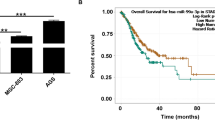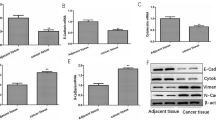Abstract
Exosome-mediated microRNA transfer has been shown to regulate cancer progression. However, the involvement of exosomal-miR-506-3p in colorectal cancer (CRC) is unknown. The goal of the research was to study into the role of exosomal-miR-506-3p in CRC. Using a qRT-PCR experiment, it was observed that CRC tissues had lower levels of miR-506-3p than non-tumor tissues. It was observed that miR-506-3p inhibited the proliferation, regulates apoptosis, and cell cycle of HT29 and SW480 cells as compared to control groups. Dual luciferase reporter assay results showed that GSTP1 was the downstream target molecule of miR-506-3p, which was consistent with the database prediction. Furthermore, FHC cells transfected with miR-506-3p could transfer miR-506-3p to SW480 cells, limiting cell growth and inducing cell death. We discovered a unique regulatory mechanism in which exosome-mediated transfer of miR-506-3p reduces proliferation and induces apoptosis in CRC through negative regulation of GSTP1, implying that exosome-mediated delivery of miR-506-3p provides fresh insight into CRC diagnostics and treatment.







Similar content being viewed by others
Data Availability
All data and materials in the manuscript will be made available by the corresponding authors.
References
Duan, L., et al. (2020). Molecular mechanisms and clinical implications of miRNAs in drug resistance of colorectal cancer. Therapeutic Advances in Medical Oncology, 12, 1758835920947342.
Goldberg, R. (2005). Advances in the treatment of metastatic colorectal cancer. Oncologist, 10(Suppl 3), 40–8.
Luo, M., et al. (2021). Drug resistance in colorectal cancer: An epigenetic overview. Biochimica et biophysica acta. Reviews on Cancer, 1876(2), 188623.
Cardeñes, B., et al. (2021). Cellular integrin α5β1 and exosomal ADAM17 mediate the binding and uptake of exosomes produced by colorectal carcinoma cells. International Journal of Molecular Sciences, 22(18), 9938.
Nabariya, D., Pallu, R., & Yenuganti, V. (2020). Exosomes: The protagonists in the tale of colorectal cancer? Biochimica et biophysica acta. Reviews on cancer, 1874(2), 188426.
Del Pozo-Acebo, L., et al. (2021). Bovine milk-derived exosomes as a drug delivery vehicle for miRNA-based therapy. International Journal of Molecular Sciences, 22(3), 1105.
Gao, Q., et al. (2020). Functional passenger-strand miRNAs in exosomes derived from human colon cancer cells and their heterogeneous paracrine effects. International Journal of Biological Sciences, 16(6), 1044–1058.
Zhang, Y., Ma, L., & Xie, Y. (2020). MiRNA-802 inhibits the metastasis of colorectal cancer by targeting FOXE1. European Review for Medical and Pharmacological Sciences, 24(4), 1778–1785.
Zhao, M., et al. (2021). miR-107 regulates the effect of MCM7 on the proliferation and apoptosis of colorectal cancer via the PAK2 pathway. Biochemical Pharmacology, 190, 114610.
Tian, F., et al. (2021). Exosome-delivered miR-221/222 exacerbates tumor liver metastasis by targeting SPINT1 in colorectal cancer. Cancer Science, 112(9), 3744–3755.
Shang, A., et al. (2020). Exosomal miR-183-5p promotes angiogenesis in colorectal cancer by regulation of FOXO1. Aging, 12(9), 8352–8371.
Chen, Y., et al. (2020). Serum exosomes derived from Hp-positive gastritis patients inhibit MCP-1 and MIP-1α expression via NLRP12-Notch signaling pathway in intestinal epithelial cells and improve DSS-induced colitis in mice. International immunopharmacology, 88, 107012.
Fu, X., et al. (2018). KIFC1, a novel potential prognostic factor and therapeutic target in hepatocellular carcinoma. International Journal of Oncology, 52(6), 1912–1922.
Xia, Y., et al. (2020). Exosome-mediated transfer of miR-1260b promotes cell invasion through Wnt/β-catenin signaling pathway in lung adenocarcinoma. Journal of Cellular Physiology, 235(10), 6843–6853.
Logozzi, M., et al. (2009). High levels of exosomes expressing CD63 and caveolin-1 in plasma of melanoma patients. PLoS One, 4(4), e5219.
Clancy, C., Joyce, M., & Kerin, M. (2015). The use of circulating microRNAs as diagnostic biomarkers in colorectal cancer. Cancer Biomarkers : Section A of Disease Markers, 15(2), 103–113.
Li, J., et al. (2018). Suppression of Capn4 by microRNA-1271 impedes the proliferation and invasion of colorectal cancer cells. Biomedicine & Pharmacotherapy = Biomedecine & Pharmacotherapie, 99, 162–168.
Ganju, A., et al. (2017). miRNA nanotherapeutics for cancer. Drug Discovery Today, 22(2), 424–432.
Li, C., et al. (2021). Long non-coding RNA FGD5-AS1 enhances osteosarcoma cell proliferation and migration by targeting miR-506-3p/RAB3D axis. Human cell, 34(4), 1255–1265.
Zhou, M., et al. (2021). LINC01433 targets miR-506-3p to promote the biological progress of nasopharyngeal carcinoma cells. Eur Arch Otorhinolaryngol, 278(9), 3363–3374.
Liang, T., et al. (2019). MicroRNA-506 inhibits tumor growth and metastasis in nasopharyngeal carcinoma through the inactivation of the Wnt/β-catenin signaling pathway by down-regulating LHX2. Journal of Experimental & Clinical Cancer Research : CR, 38(1), 97.
Fu, X., et al. (2021). Downregulation of NEAT1 sensitizes gemcitabine-resistant pancreatic cancer cells to gemcitabine through modulation of the miR-506-3p/ZEB2/EMT axis. American Journal of Cancer Research, 11(8), 3841–3856.
Lin, C., et al. (2018). miR-133b reverses cisplatin resistance by targeting GSTP1 in cisplatin-resistant lung cancer cells. International Journal of Molecular Medicine, 41(4), 2050–2058.
Zeng, Q., Lu, H., & Wang, X. (2005). Molecular characterization of a glutathione transferase from Pinus tabulaeformis (Pinaceae). Biochimie, 87(5), 445–455.
Cullen, K., et al. (2003). Glutathione S-transferase pi amplification is associated with cisplatin resistance in head and neck squamous cell carcinoma cell lines and primary tumors. Cancer Research, 63(23), 8097–8102.
Song, B., et al. (2019). Combined detection of HER2, Ki67, and GSTP1 genes on the diagnosis and prognosis of breast cancer. Cancer Biotherapy & Radiopharmaceuticals, 34(2), 85–90.
Puerta-García, E., et al. (2020). Effect of DPYD, MTHFR, ABCB1, XRCC1, ERCC1 and GSTP1 on chemotherapy related toxicity in colorectal carcinoma. Surgical Oncology, 35, 388–398.
Wang, X., et al. (2020). Exosome-delivered circRNA promotes glycolysis to induce chemoresistance through the miR-122-PKM2 axis in colorectal cancer. Molecular Oncology, 14(3), 539–555.
Funding
This work was supported by the National Natural Science Foundation of China (Grant No. 81802372), the Natural Science Foundation of Hebei Province (Grant Nos. H2020107005 and H2020107002), and the Scientific and Technological Project of the Hebei Province of China (Grant No. 14397702D).
Author information
Authors and Affiliations
Contributions
B. X.: writing, conceptualization, methodology, software.
B. X.: and Y. W.: data curation, writing, original draft preparation.
Y. W.: reviewing and editing.
Corresponding author
Ethics declarations
Ethical Approval
Not applicable.
Consent to Participate
Not applicable.
Consent for Publication
Not applicable.
Conflict of Interest
The authors declare no competing interests.
Additional information
Publisher's Note
Springer Nature remains neutral with regard to jurisdictional claims in published maps and institutional affiliations.
Rights and permissions
Springer Nature or its licensor (e.g. a society or other partner) holds exclusive rights to this article under a publishing agreement with the author(s) or other rightsholder(s); author self-archiving of the accepted manuscript version of this article is solely governed by the terms of such publishing agreement and applicable law.
About this article
Cite this article
Xuan, B., Wang, Y. Exosome-Transmitted miR-506-3p Inhibits Colorectal Cancer Cell Malignancy via Regulating GSTP1. Appl Biochem Biotechnol 195, 2015–2027 (2023). https://doi.org/10.1007/s12010-022-04268-x
Accepted:
Published:
Issue Date:
DOI: https://doi.org/10.1007/s12010-022-04268-x




